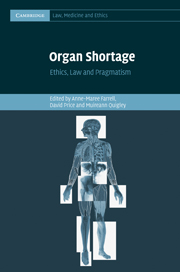Book contents
- Frontmatter
- Contents
- List of figures
- List of tables
- Contributors
- Acknowledgements
- List of abbreviations
- Table of cases
- Table of legislation
- Part I Setting the scene
- Part II Current issues affecting organ shortage
- Part III Strategies for addressing organ shortage
- Part IV Comparative perspectives
- 10 Institutional organisation and transplanting the ‘Spanish Model’
- 11 Kidney donation: lessons from the Nordic countries
- 12 Organ donation and transplantation: the Canadian experience
- 13 Systematic increases in organ donation: the United States experience
- Part V Current reform and future challenges
- Bibliography
- Index
11 - Kidney donation: lessons from the Nordic countries
from Part IV - Comparative perspectives
Published online by Cambridge University Press: 29 March 2011
- Frontmatter
- Contents
- List of figures
- List of tables
- Contributors
- Acknowledgements
- List of abbreviations
- Table of cases
- Table of legislation
- Part I Setting the scene
- Part II Current issues affecting organ shortage
- Part III Strategies for addressing organ shortage
- Part IV Comparative perspectives
- 10 Institutional organisation and transplanting the ‘Spanish Model’
- 11 Kidney donation: lessons from the Nordic countries
- 12 Organ donation and transplantation: the Canadian experience
- 13 Systematic increases in organ donation: the United States experience
- Part V Current reform and future challenges
- Bibliography
- Index
Summary
The first successful kidney transplant in the world was performed in Boston, United States (USA), in 1954. Only two years later, the first kidney transplant in the Nordic countries was performed in Norway. The technique spread quickly across the Nordic countries: the first successful kidney transplantation with long-term functionality was performed in Norway in 1963, closely followed by Denmark, Finland and Sweden in 1964. Currently, the majority of organ donation (around 67 per cent) involves kidneys. The Nordic countries have long shared historical, cultural and political traditions; in the aftermath of the Second World War, the Nordic Council was founded in 1952, and an agreement on Nordic co-operation was signed in 1962 which became known as the Helsinki Treaty. The Treaty provides a basis for co-operation at many levels, for example in the areas of law, education, social welfare, economy and transportation. The Nordic countries also have a longstanding tradition of working together on legislative issues, as well as being influenced by each other's laws and jurisprudence. This includes the area of legislating for organ procurement and transplantation.
Co-operation amongst the Nordic countries on organ transplantation commenced very early on. Scandiatransplant was founded in 1969 in order to pool Nordic resources and to find matches for rare tissue types. In the early years, drugs for immunosuppression were not very effective and therefore matching for tissue type (HLA, Human Leucocyte Antigen) was more important. More than 50 per cent of kidneys were shipped to another Nordic country.
- Type
- Chapter
- Information
- Organ ShortageEthics, Law and Pragmatism, pp. 171 - 184Publisher: Cambridge University PressPrint publication year: 2011



